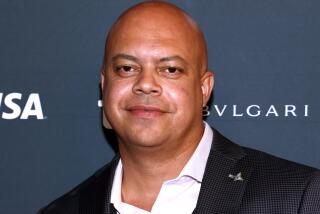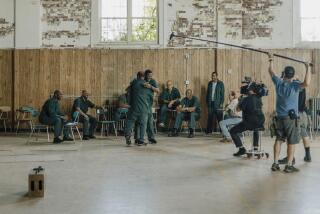Wrongfully convicted Dewey Bozella to make pro fight debut
- Share via
Dewey Bozella is an inspirational speaker these days, reminding America why it should believe in innocence until proven guilty.
Two years after walking out of New York’s Sing Sing prison a free man following a 26-year prison stint for a murder he did not commit, Bozella will spend Saturday living out one of the wishes he held close as his life withered behind bars.
An aspiring boxer as a youth, Bozella, now 52, has earned a spot as a cruiserweight on the undercard of the fight between world light-heavyweight champion Bernard Hopkins and Chad Dawson at Staples Center.
“I’m not just here to fight, I’m here to win,” Bozella said Wednesday of his pro debut against winless Larry Hopkins (0-3), no relation to Bernard. “I’m telling a lot of people now to never give up. That’s what this is all about for me.
“I never gave up on doing this. I need to do this. It’s from the heart.”
Bozella’s tragic tale began in 1977, when a 92-year-old woman named Emma Crapser was murdered inside her Poughkeepsie, N.Y., home after returning from playing bingo. The killer shoved six feet of cloth down Crapser’s throat, and took off with valuables inside the home.
The testimony of two convicts and one of their siblings resulted in a 1983 murder conviction for Bozella, even when the fingerprint of another man who later committed a similar murder in the area was secured from the Crapser crime scene.
In prison, Bozella won a Sing Sing boxing tournament, met and married his wife, Treena, attained bachelor’s and master’s degrees in theology and even staged plays, including “A Few Good Men,” and “12 Angry Men,” with fellow prisoners.
“Mind my business and do my time,” Bozella said of his prison life. “Boxing helped ensure I was left alone.”
In 1990, he was given a second trial. With the jury deliberating, a prosecutor offered him a plea deal that would have allowed Bozella to walk out with time served as long as he admitted guilt in the Crapser murder. He refused. He was convicted again.
Why not just give the prosecutor what he wanted and take freedom?
“I wasn’t thinking like that,” Bozella said. “I can’t admit to something I didn’t do. Period.
“There were times I felt down, frustrated. I’d watch people [inmates] die in front of me. The possibility of dying in prison, that was hard. I decided after the second conviction, though, that I’d have no anger. … I had to find my peace.”
He was denied parole four times. The parole board told his attorneys it didn’t want to hear claims of innocence, but rather remorse over the murder. “Catch-22,” Bozella said.
But a legal clinic, the Innocence Project, referred his case to attorney Ross Firsenbaum, a securities/bankruptcy litigator whose New York law firm, WilmerHale assisted Bozella pro bono.
Firsenbaum said one of those who testified against Bozella recanted his story, and the fingerprint of the other suspect and the lack of physical evidence was part of his successful appeal to the New York Supreme Court.
Finally, on Oct. 28, 2009, a Dutchess County, N.Y., judge affirmed a state Supreme Court justice ruling and released Bozella, who was awarded the Arthur Ashe Courage Award in July at the ESPYs in Los Angeles.
Bozella originally tried and failed in August to earn a boxing license from the California State Athletic Commission, and was then invited to work out with former prisoner Bernard Hopkins in Philadelphia.
He staged another workout before regulators last month, passing.
“It was a special moment for everyone who was there,” said Oscar De La Hoya, Saturday’s fight promoter.
“This is not a charity case,” Bernard Hopkins said Wednesday. “This is a man fulfilling his dream.”
twitter.com/latimespugmireMore to Read
Go beyond the scoreboard
Get the latest on L.A.'s teams in the daily Sports Report newsletter.
You may occasionally receive promotional content from the Los Angeles Times.











